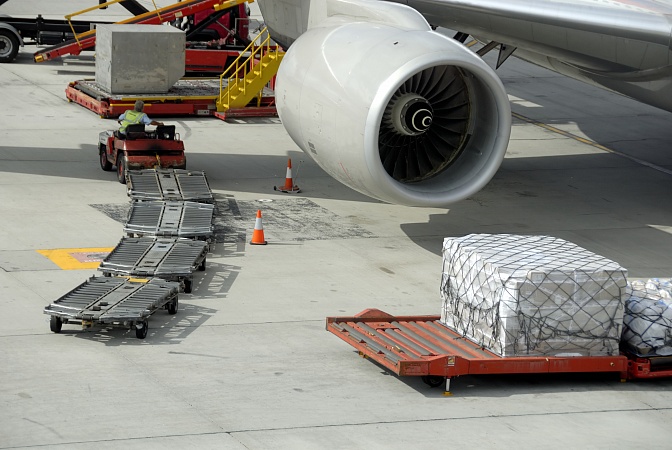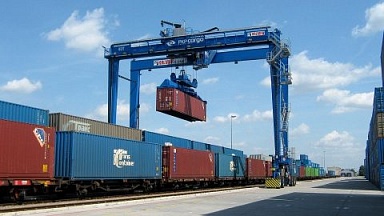Cargo congestion is easing at key European airports such as Frankfurt (FRA) and Amsterdam (AMS) following several weeks of exceptionally high demand combined with local handling issues that led to delays and even some flight diversions.
Cargo handling and airport sources have told Lloyd’s Loading List that they had implemented a number of new measures to help manage peak volumes, including introducing new incentives and new technologies to speed up the collection of cargo by freight forwarders and consignees, to help manage exceptional demand flows and patterns in recent weeks.
International cargo airline AirBridgeCargo (ABC) confirmed to Lloyd’s Loading List that the beginning of 2021 «was really strong, and even despite Chinese New Year, which usually slows down cargo operations, some European stations (likes of FRA/AMS/LGG) experienced high January and February import volumes».
ABC said the biggest impact was experienced at FRA, where volumes rose sharply by more than 40%, year on year (YOY). On top of this in Frankfurt, the number of imports pieces per tonne was significantly higher than this time last year, «which has a tremendous impact on the handling processes and staff workload», ABC noted.
It added: «Together with our partners, we have found the solutions to mitigate the risks and deliver our customers’ cargoes».
Flight diversion for two-week period
Those solutions included ABC implementing flight diversion for a two-week period from 14 February to 28 February to other EU online stations, with its subcontracted cargo handling partner at FRA, Frankfurt Cargo Services (FCS) working with ABC on the «conditions for smooth transition processes, considering not only the physical transfer of the shipments but also proper data transfer and messaging», noting that «the new setup will be launched shortly».
In the meantime, it said FCS was «simultaneously working on alternative solutions in FRA by adding subcontracted third-party companies into their portfolio to support with second-line warehouse space and additional staff, using also the centralised ‘Speedgate’ of Fraport to distribute import units directly to the additional handling facilities authorised by and on behalf of FCS».
ABC said that as soon as things settle down, dedicated cargo handling will take place for ABC at FCS’ first-line warehouse at FRA — its main terminal with airside access.
Nevertheless, FCS said it was pleased that it had created «a reliable solution also for the future, which gives us the confidence that in any case of further unpredictable peaks at FRA with already very limited handling capacities, our imports can be smoothly handled without any contingency actions needed from our side to again divert flights into other EU stations».
Fellow cargo handler Swissport said it was not experiencing congestion at its facilities in Germany, noting that «our new and bigger warehouse at FRA can handle slightly increasing volumes». But it acknowledged that there had been «no Chinese New Year relief this year», and said «PPE charters remain the main challenge on the import side».
FRA-based carrier Lufthansa Cargo said that despite the ongoing challenges caused by the global pandemic, it was able to «cope with the high demand at our home hub Frankfurt. Everyone involved in operations is working under high pressure and very flexibly, which enables us to keep processes running smoothly.»
Cargo sources indicated to Lloyd’s Loading List that it was the FCS/WFS warehouses at FRA that seemed especially under pressure, particularly from Asian freighter customers.
But other sources confirmed that the pressure was not limited to FRA.
New phenomenon
Cargo handling operator Dnata told Lloyd’s Loading List: «The whole industry is experiencing a new phenomenon during the pandemic. Whilst the overall level of cargo volumes is broadly back in line with pre-pandemic levels, a much larger proportion of that cargo is being carried on dedicated freighters, including passenger aircraft carrying cargo, rather than on bellies of passenger flights. This has resulted in more of the cargo being funnelled through the main cargo gateways, rather than being spread across a broader range of airports. This has naturally led to congestion issues at these main gateways.
«We have suffered congestion in Amsterdam as a result of peak volumes which coincided with recent snowstorms and an ETV breakdown which resulted in a backlog of import cargo. We have implemented an extensive action plan including direct delivery of units to the forwarders, providing financial incentives to forwarders to collect freight over the weekends — which is not usual practice in Amsterdam — as well as adding additional capacity for import breakdown. We are making good progress and working closely with our airline customers and the freight community to resume normality as soon as possible.»
And freight forwarder Kuehne + Nagel (KN) said it had experienced several points of congestion in Europe at different ground handling agents in recent weeks, «starting with the snow in AMS at the beginning of February, further accompanied by backlog situations in FRA due to a massive jump in volumes, YoY».
KN said «carrier re-routings and shifting of allocations were the primary measures to mitigate the impact, closely connected with the maximum usage of forwarder BUPs to avoid GHA warehouses».
Demand still very high
The forwarder added: «Right now, the demand stays very high and might traditionally further increase in March, but the congestions have been heavily reduced.»
Robert Fordree, executive vice president for cargo at Menzies Aviation, said his organisation had obviously noted some of the issues, but said Menzies had «not been as affected in comparison to some of our peers».
He added: «LAX had its challenges prior to Christmas which was compounded by covid infection rates in California but is now operating much better. Our operation in AMS is handling volumes well and we are actually providing support and an outlet to some non-Menzies customers there to assist.
«In London, having right-sized our customer mix, our operation is handling the increased volumes well. We are also looking at introducing a covid testing regime at LHR to better support employee welfare and to maintain our workforce so that we can continue to manage well the volume surge.»
Fordree noted: «We expect the current ‘boom’ to continue into Q2 whist passenger aircraft schedules remain low and freighter and pax freighters continue to uplift increased cargo volumes.»
Dialogue with all participants
Frankfurt Airport operator Fraport said it was «in dialogue with all participants along the supply chain on how to deal with this difficult situation and our goal is to develop joint solutions with our clients».
A spokesperson noted: «Frankfurt Airport has been experiencing particularly high volumes over the last weeks. In January, Frankfurt Airport recorded its highest January result ever in terms of air freight — more than 172,000 tonnes — despite the ongoing lack of capacity for belly freight transported on passenger planes. At the beginning of February, we experienced exceptionally high import volumes just before Chinese New Year. This peak has been successfully processed.»
The airport said representatives of the Air Cargo Community Frankfurt «remain in close contact in order to maintain the flow of cargo at the CargoCities. However, all companies continue to face unusual freight structures and very high numbers of packages. In addition, many new cargo partners continue to be involved in the handling of the goods. The fluctuations in the collection of the import freight continue.»
The spokesperson added: «We, therefore, appeal to everyone involved to make the best possible contribution to document quality and to a continuous flow of freight and therefore avoiding unnecessary waiting times.»
Speed Gate improvements
She said all parties involved had «taken a lot of measures to minimize the challenges. For example, processes at the Speed Gate were promptly adjusted, thus enabling a faster transportation of the goods. Furthermore, an additional Cargo Handling Agent now uses the Speed Gate.»
She added: «This is a further step towards an even more resilient handling procedure. In addition, all of airport operator Fraport’s employees working in the air freight handling are on full time duty — there is no short-term working. Moreover, we make additional airside areas available — whenever possible — so as not to jeopardise warehouse performance.
«Fraport ground handling is in close contact with the cargo handling agents to secure an efficient use of dollies and other transport equipment.»
She confirmed that the Speed Gate is a capability at Frankfurt Airport CargoCity South at which cargo is unloaded at one of four automated gates, security checked using an automated system, and brought directly to the aircraft — also works the other way round for the import process.
She added: «There are four gates for trucks and one additional gate for oversized shipments as well as loose cargo wagons. The Speed Gate is open for use to every cargo handler (first row as well as second row) as well as a kind of pick-up-point for forwarders in coordination with the responsible cargo handling agent.»
A spokesperson for Brussels Airport noted: «We have also seen a strong increase in import freight at BRU in recent weeks. However, we are not experiencing any problems in handling it. There is sufficient warehouse and handling capacity to handle this increase.»




